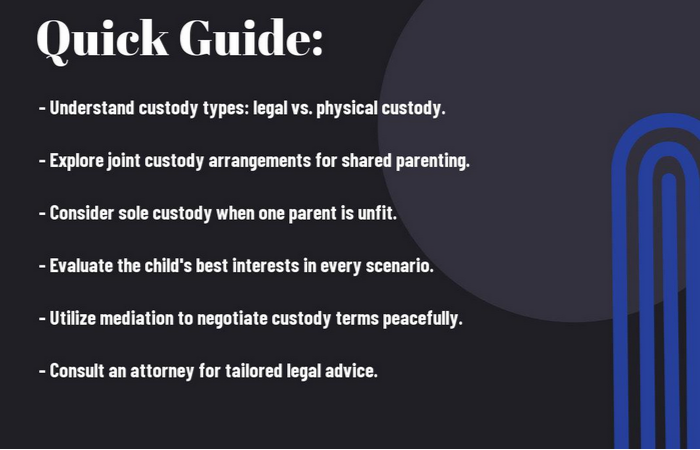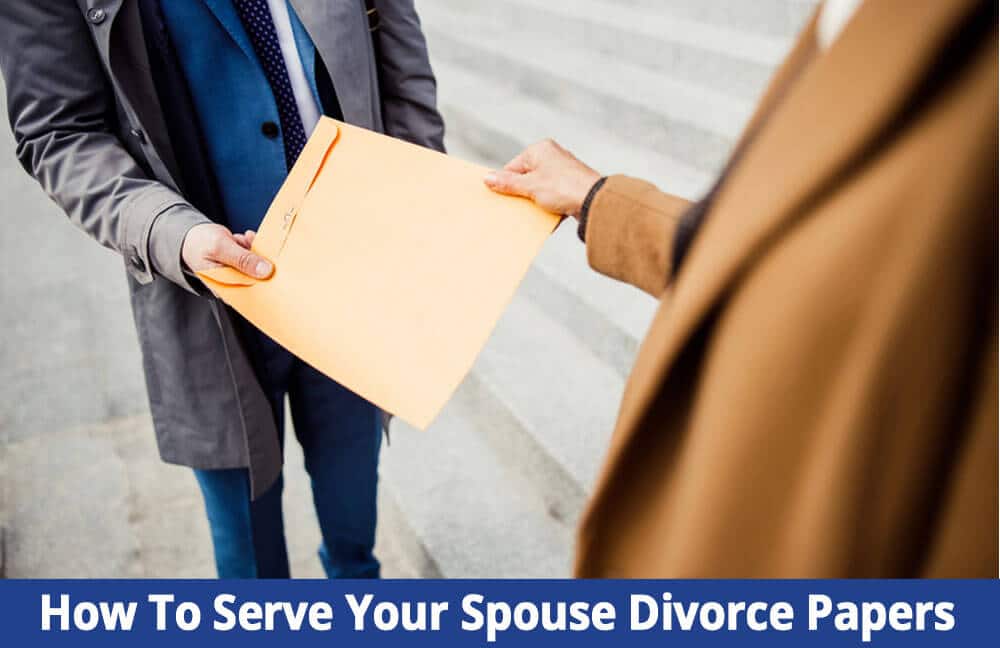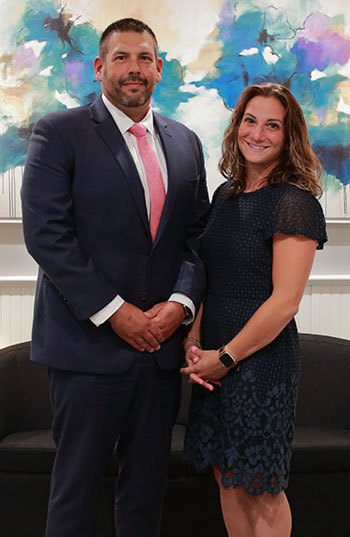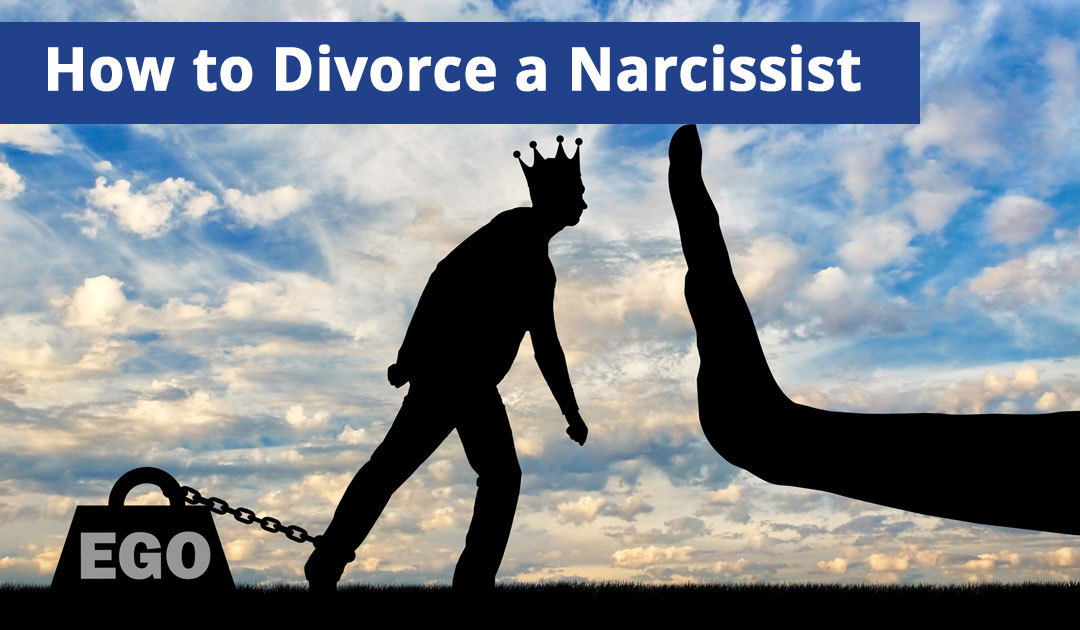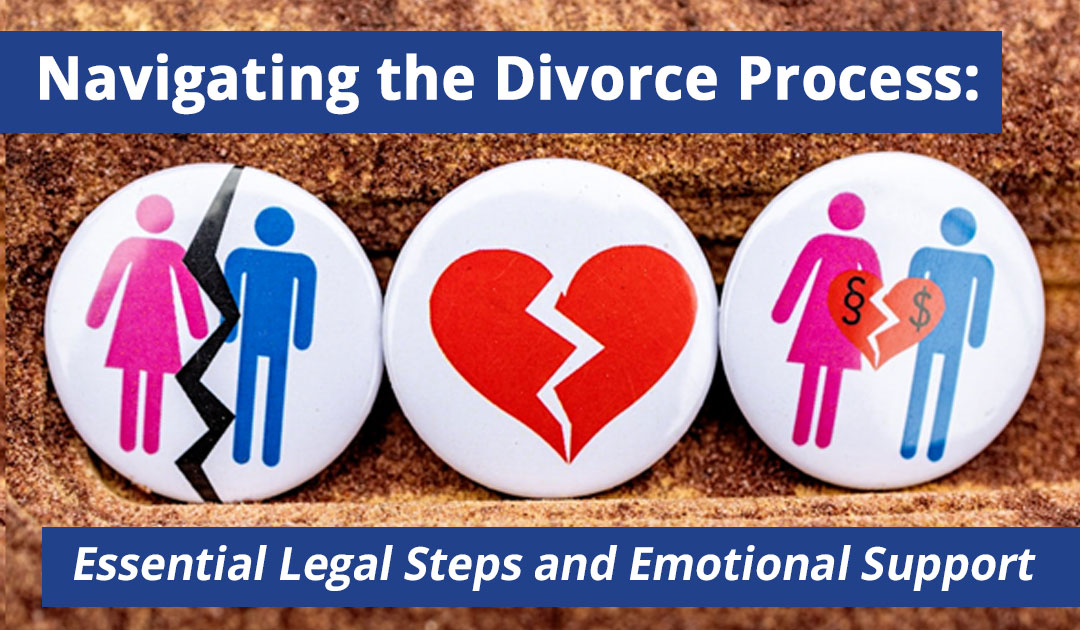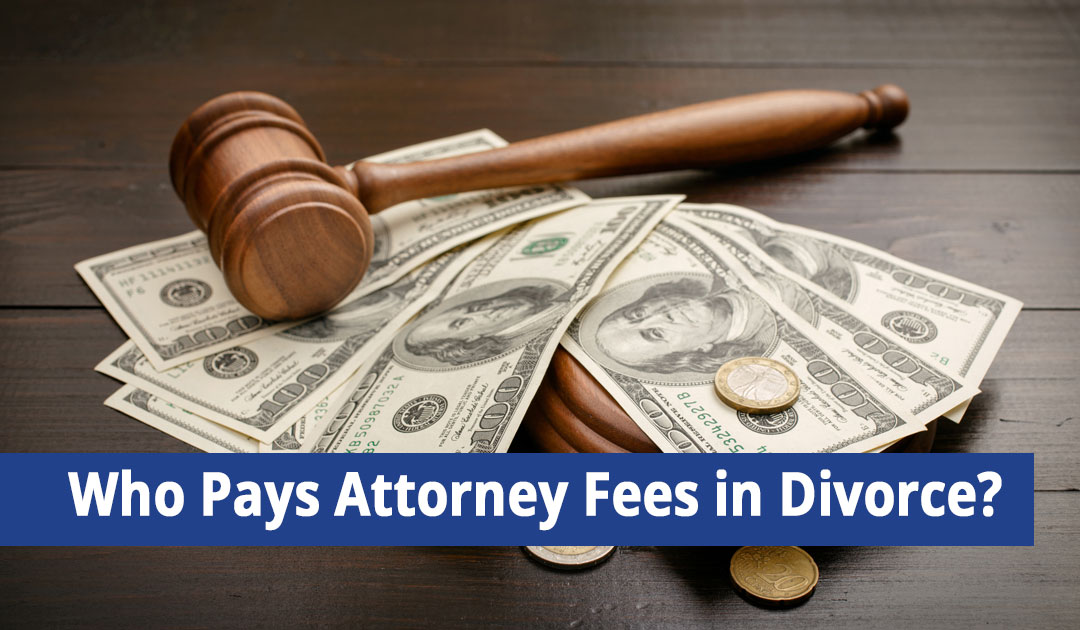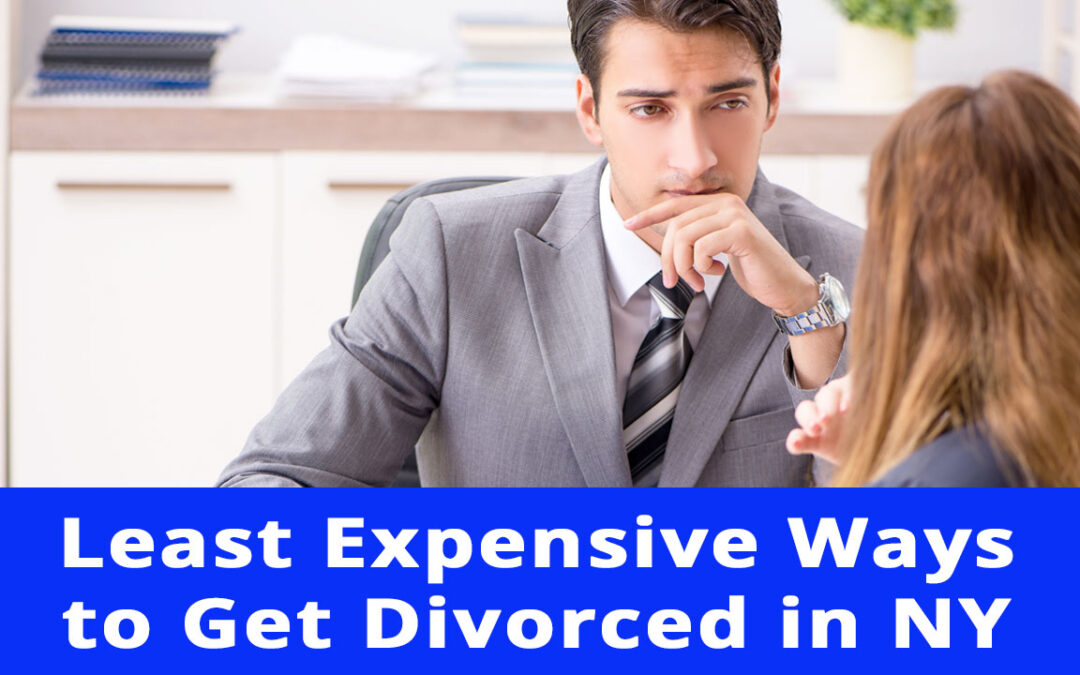
Least Expensive Ways to Get Divorced on Long Island, NY
Least Expensive Ways to Get Divorced on Long Island, NY
There’s no denying that divorce can be both emotionally and financially challenging, especially here on Long Island, NY. We understand you want to find the least expensive way to get divorced without sacrificing the quality of your legal support. In this guide, We’ll walk you through practical options like uncontested divorce, divorce mediation or collaborative divorce, and choosing experienced yet affordable attorneys. Our goal is to help you save money while ensuring your rights are fully protected throughout the process. By the end, you’ll feel more confident about navigating your divorce in the most cost-effective way.
Key Takeaways for Affordable Divorce Options
- Filing for an uncontested divorce is typically the least expensive option, especially if both parties agree on all terms, including property division and spousal and child support.
- Using divorce mediation or collaborative divorce services can reduce costs by avoiding lengthy court battles and attorney fees.
- For divorces without children or complex assets, opting for minimal legal assistance or limited-scope representation can lower expenses.
- Filing paperwork yourself through the New York State Unified Court System’s online resources can cut down on attorney fees.
- Choosing a divorce attorney specialized in affordable flat-fee packages may provide predictable and lower overall costs on Long Island, NY
Navigating the Costs of Divorce on Long Island, NY
The financial aspect of divorce on Long Island varies widely depending on your circumstances. While uncontested divorces generally reduce expenses, other factors like attorney fees, court costs, and additional services can add up quickly. We’ve seen cases where simple filings cost under $1,000, but complicated ones often exceed $10,000. Understanding how each cost integrates into your overall divorce budget helps you spot where savings can be achieved without sacrificing quality legal representation.
Breakdown of Typical Divorce Expenses
Typical divorce costs include court filing fees of around $320 in Nassau and Suffolk counties, attorney hourly rates ranging from $200 to $400, and additional fees for mediation or custody evaluations when applicable. You might also pay for document preparation, service fees, and expert consultations. Uncontested divorces generally incur fewer charges, keeping total expenses lower. This makes negotiating agreements and minimizing litigation a path to less expensive divorce proceedings.
Factors Influencing Divorce Costs in New York
Divorce costs depend on several elements including whether there are children of the marriage, complexity of asset division, and the cooperation level between spouses. Choosing a divorce attorney who has specific rates for uncontested or no-children cases can lower costs. Location-based court fees and individual attorney rates also affect overall charges. This calls for strategic decisions on legal representation and your divorce approach to manage your budget effectively.
The following specific factors impact your divorce costs in New York:
- Presence of minor children usually requires custody evaluations and additional hearings.
- Property and debt division complexity increases document preparation and negotiation time.
- Attorney experience and specialization can influence rates but ensure better case handling which can lower costs in the long run.
- Filing an uncontested divorce where both parties agree on all issues reduces court appearances and attorney hours.
Recognizing these divorce factors lets you weigh your options between expenses and legal support quality.
Unpacking the Best Low-Cost Divorce Options
Balancing affordability with quality is key when seeking divorce solutions on Long Island, NY. Low-cost divorce options include DIY filings, mediation, and limited-scope attorney services. Each offers a spectrum of savings—DIY can cost under $500, while mediation typically runs between $1,000 and $3,000, a fraction of full attorney fees that often exceed $10,000 for a contested divorce. Understanding your unique situation—whether you have children, shared assets, or disputes—helps pinpoint the best path to minimize expenses without sacrificing quality and fairness.
DIY Divorce: Weighing Pros and Cons
We’ve found that DIY divorce appeals to couples when both parties agree on all the terms of their divorce and there are no complex issues. A DIY divorce requires thorough preparation and careful filing but eliminates attorney fees entirely. There are major risks to this type of divorce, as complications can arise later when issues you hadn’t thought of become apparent. This is why it’s always advisable to have an experienced attorney review your divorce agreement before you file it in Nassau County Supreme Court or Suffolk County Supreme Court.
DIY Divorce: Pros and Cons |
|
|
Pros |
Cons |
|
Minimal cost (court fees only) |
Risk of errors in paperwork |
|
Complete control over process |
Can be confusing without legal knowledge |
|
Faster resolution if uncontested |
No legal advice to protect rights |
|
Suitable for no children or assets |
Not recommended if disputes exist |
|
Flexible and private |
Potential for delays due to mistakes |

Divorce Mediation: An Affordable Alternative to Traditional Divorce
Divorce mediation offers mediator-guided negotiation, allowing couples to resolve disputes collaboratively. On Long Island, NY mediation fees average $150–$250 per hour, often concluding within a few sessions, keeping costs significantly below litigated divorces.
The success rate for mediation hovers near 80%, particularly when both parties show willingness to compromise. Cases involving children or moderate asset division benefit greatly from mediation’s structured yet less adversarial environment. Mediators help draft agreements suitable for courts, reducing follow-up expenses or court delays. Choosing mediation can reduce stress and preserve communication channels, which proves especially valuable when co-parenting arrangements must follow.
Finding the Right Legal Representation Without Breaking the Bank
Choosing an affordable yet skilled divorce attorney can dramatically reduce your overall costs while protecting your interests. On Long Island, NY some lawyers offer limited-scope services or flat fees for uncontested divorces, especially when no children or complex assets are involved. You can negotiate payment plans or seek local attorneys who have experience in streamlined divorce cases to avoid high hourly charges. Focusing on attorneys who communicate clearly and handle paperwork efficiently often leads to the best balance of cost and service. Learn how to find the best Long Island NY divorce law firm here.
Characteristics of Affordable and Effective Divorce Attorneys
Effective low-cost divorce lawyers tend to have extensive experience handling uncontested or simple divorces efficiently, keeping billable hours minimal. They offer transparent flat fees or capped rates rather than less predictable hourly billing. You’ll notice that these attorneys emphasize clear communication, proactive case management, and accessible client portals to minimize time spent on back-and-forth communication. Many focus on no-child custody cases, which typically reduces complexity and legal expenses.
Legal Aid Resources and Non-Profit Organizations
Numerous legal aid programs and nonprofit organizations support Long Island residents seeking affordable divorce assistance. Groups like Nassau Suffolk Law Services provide free or sliding-scale consultations, often handling uncontested divorces or advising on paperwork. These organizations help bridge the gap for those who don’t qualify for traditional legal aid but still need guidance at a lower cost. Utilizing these resources can significantly lessen the financial burden but may sacrifice legal quality.
Programs such as the New York State Unified Court System’s Self-Help Centers also offer invaluable resources, including workshops and standard forms geared toward uncontested and simplified divorces. Nonprofits often collaborate with volunteer attorneys who provide limited-scope services, like document review or brief consultations, at reduced or no cost. This access enables you to handle much of the process independently while still receiving oversight to avoid costly mistakes, making the divorce journey more manageable and budget-friendly.

Strategies to Minimize Your Divorce Expenses
Cutting divorce costs starts with clear communication and a well-organized approach. Choosing uncontested divorce paths, especially when no children or significant assets are involved, can significantly lower your fees. Utilizing flat fee services offered by some Long Island attorneys can prevent unexpected bills. We suggest focusing on mediation rather than lengthy litigation if possible; it tends to be faster and more affordable. Always gather and organize all necessary documents beforehand to reduce lawyer billable hours. Assume that early agreement on key issues like property division and spousal and child support can drastically reduce expenses.
Essential Cost-Cutting Tips During the Process
Keeping a detailed budget for your divorce is a simple but effective strategy. To minimize costs:
- Limit attorney consultations to vital matters only
- Use online legal forms for fully uncontested divorces
- Represent yourself for minor filings where legally permitted
- Schedule meetings efficiently and combine multiple questions into one session
Assume that every hour saved reduces your legal fees, so being prepared and concise will make a real difference.
Maximizing Resources: Share Costs with Your Spouse
Collaborative divorce options on Long Island, NY often let couples split mediator and attorney fees, making it more budget-friendly for both parties. If you and your spouse agree to work cooperatively, sharing expenses for joint legal services or mediation sessions can lower individual costs by 30–50%. We’ve seen cases where this cooperative budgeting shortened the divorce process and prevented expensive court battles. Open financial dialogue with your spouse can turn shared costs into significant savings during your divorce.
Expanding on sharing costs, consider joint consultations with a mediator instead of separate attorneys. This approach helps both parties receive guidance simultaneously and reduces duplicative fees. When both spouses participate in drafting settlement agreements collaboratively, lawyer costs decline since less back-and-forth review is needed. Early cooperation and transparent cost-sharing agreements often prevent unexpected expenses and foster a smoother, more affordable divorce.
Avoiding Common Financial Pitfalls in Divorce
Diving into divorce without a clear financial plan can quickly increase your costs and complicate the process for you. Litigation over assets, inconsistent documentation, and overlooking tax implications often mean higher attorney fees and prolonged settlements. By staying organized and focusing on uncontested terms, you can reduce surprises that can drive up your expenses. Also, understanding New York divorce laws, especially around property division and support obligations, helps avoid unnecessary disputes. On Long Island, aligning your expectations and working with an experienced attorney who specializes in no-children divorces can streamline your case and protect your finances from avoidable pitfalls.
Mistakes That Lead to Higher Costs
One common mistake many couples make is in failing to gather all financial records upfront, which causes delays and repeated requests that increase legal fees. Getting stuck in custody battles or disputes over minor assets also escalates costs unnecessarily. In New York, contested divorces often triple the legal expense compared to uncontested divorces, especially when attorneys are billing hourly. Ignoring options like mediation or collaborative divorce often leads to prolonged court involvement, which hits your wallet harder than settling out of court. Choosing a divorce lawyer adept at affordable strategies helps prevent these costly errors.
Long-Term Financial Planning Post-Divorce
After your divorce settlement, recalculating your budget with your new financial reality will help ensure your financial stability post-divorce. Factoring in support payments, adjusted income, and tax changes (spousal support taxes, child support taxes) early reduces stress down the road. In New York, understanding how spousal support durations align with the length of your marriage helps set realistic financial goals. Investing in retirement accounts and reviewing insurance coverage post-divorce safeguards your future. A divorce attorney who offers guidance on these aspects adds value beyond just settling paperwork, helping you rebuild a solid financial foundation for your future.
Going deeper into long-term planning means not only adjusting monthly expenses but also reassessing asset management. For example, dividing retirement accounts like 401(k)s or IRAs under a qualified domestic relations order (QDRO) avoids tax penalties. Estate planning should also be updated, especially if you had joint wills or beneficiary designations with your ex-spouse. On Long Island, NY some attorneys include referrals to estate planners who specialize in post-divorce transitions, saving you money and preventing costly mistakes that arise from mismanaged funds. This holistic approach ensures your financial health is protected well beyond the divorce finalization.
Least Expensive Ways to Get Divorced on Long Island, NY
If you’re looking for the least expensive way to get divorced on Long Island, NY, we suggest focusing on uncontested divorces and exploring divorce mediation or collaborative divorce options. These approaches help you avoid costly court battles and large attorney fees. You can also consider representing yourself if your case is straightforward, especially when there are no children or complex assets involved, but be aware that there are significant risks in this approach. By understanding your options and being proactive, you can manage your divorce process efficiently while keeping your expenses low.
Frequently Asked Questions About This Post
Q: What is the least expensive way to get divorced on Long Island, NY?
A: The least expensive way to get divorced on Long Island typically involves an uncontested divorce, where both parties agree on all key issues like property division, spousal and child support, and child custody without going to court. Filing the necessary paperwork yourself and using resources provided by the New York court system can help minimize legal fees.
Q: Are there affordable divorce attorneys available on Long Island, NY?
A: Yes, there are divorce attorneys on Long Island, NY who offer reasonable rates or flat fees for uncontested divorces. Some attorneys provide limited-scope representation, where they assist with specific parts of the process, which can reduce costs. We advise comparing fees, services and your rapport with the attorney before choosing a divorce lawyer.
Q: Can divorce mediation help reduce divorce costs on Long Island, NY?
A: Divorce mediation is often a cost-effective alternative to traditional divorce litigation. By working with a neutral mediator, couples can resolve disputes collaboratively, avoiding lengthy court battles and expensive attorney fees. Many mediators on Long Island specialize in family law and offer flexible fee structures.
Q: What filing fees should I expect for a divorce on Long Island, NY?
Q: Is it possible to handle a Long Island, NY divorce without a lawyer to save money?
A: Yes, it is possible to file for divorce without an attorney, especially if the divorce is uncontested and straightforward. The New York State Unified Court System provides forms and instructions to guide self-represented individuals. However, if disputes arise, consulting an attorney may be advisable to protect your interests.
“My ex and I met with Mr. Hornberger to attempt mediation. While we were unable to successfully mediate (Mr. Hornberger tried his best to help make mediation a quick and easy process). Mr. Hornberger was able to help with the sale of our house and later purchase of my new home. He was always super responsive and made the whole process super simple. Would highly recommend!“
~Sarah Sheridan
“My ex and I met with Mr. Hornberger to attempt mediation. While we were unable to successfully mediate (Mr. Hornberger tried his best to help make mediation a quick and easy process). Mr. Hornberger was able to help with the sale of our house and later purchase of my new home. He was always super responsive and made the whole process super simple. Would highly recommend!“
GET YOUR FREE CONSULTATION TODAY
Call 631-923-1910 or fill in the form below

Horberger Verbitsky, P.C. partners Robert E. Hornberger, Esq. and Christine M. Verbitsky, Esq.
Get your complimentary consultation and case evaluation with our experienced attorneys today.
Your attorney will describe the many options available and determine together which is the right solution for you. By the end of this conversation, we’ll all understand how we can best help you to move forward.
No Cost or Obligation
There is no cost or obligation for this initial consultation. It is simply an opportunity for us to get to know each other, answer your questions and learn if Hornberger Verbitsky, P.C. is right the right law firm for you. Give us a call at 631-923-1910 or fill in the short form below for your free consultation and case evaluation.
About the Author
Robert E. Hornberger, Esq., Founding Partner, Hornberger Verbitsky, P.C.
- Over 20 years practicing matrimonial law
- Over 1,000 cases successfully resolved
- Founder and Partner of Hornberger Verbitsky, P.C.
- Experienced and compassionate Long Island Divorce Attorney, Family Law Attorney, and Divorce Mediator
- Licensed to practice law in the State of New York
- New York State Bar Association member
- Nassau County Bar Association member
- Suffolk County Bar Association member
- “Super Lawyer” Metro Rising Star
- Nominated Best of Long Island Divorce Attorney four consecutive years
- Alternative Dispute Resolution Committee Contributor
- Collaborative Law Association of New York – Former Director
- Martindale Hubbell Distinguished Designation
- America’s Most Honored Professionals – Top 5%
- Lead Counsel Rated – Divorce Law
- American Institute of Family Law Attorneys 10 Best
- International Academy of Collaborative Professionals
- Graduate of Hofstra University School of Law
- Double Bachelor’s degrees in Philosophy, Politics & Law and History from SUNY Binghamton University
- Full Robert E. Hornberger, Esq. Bio

















